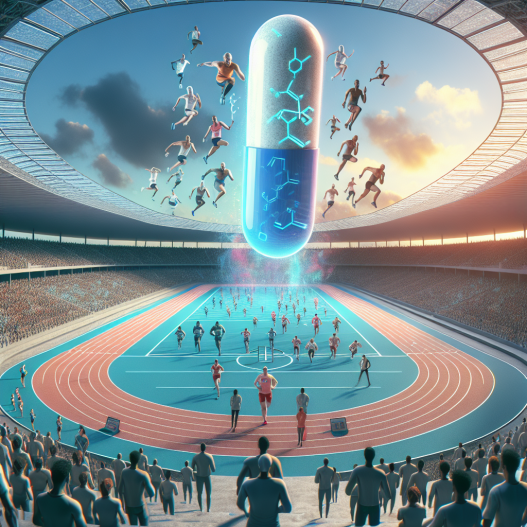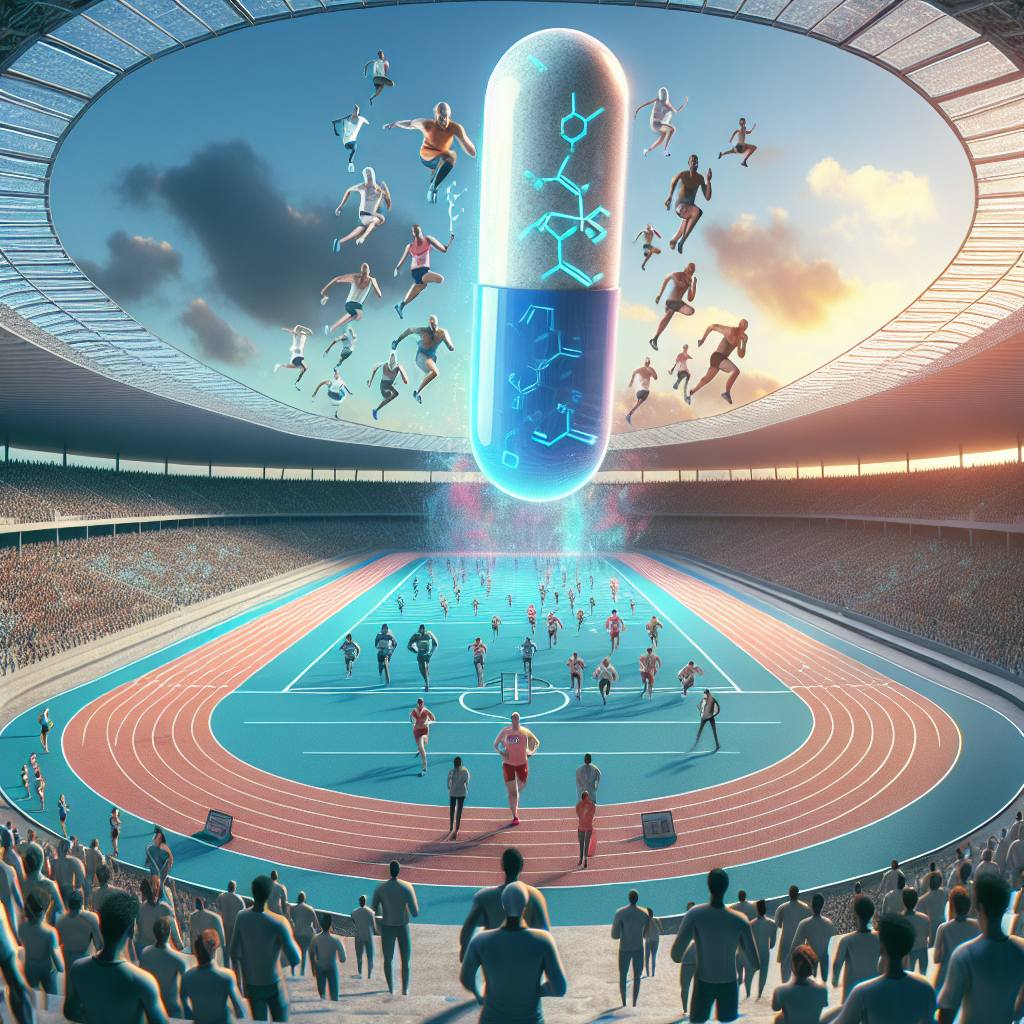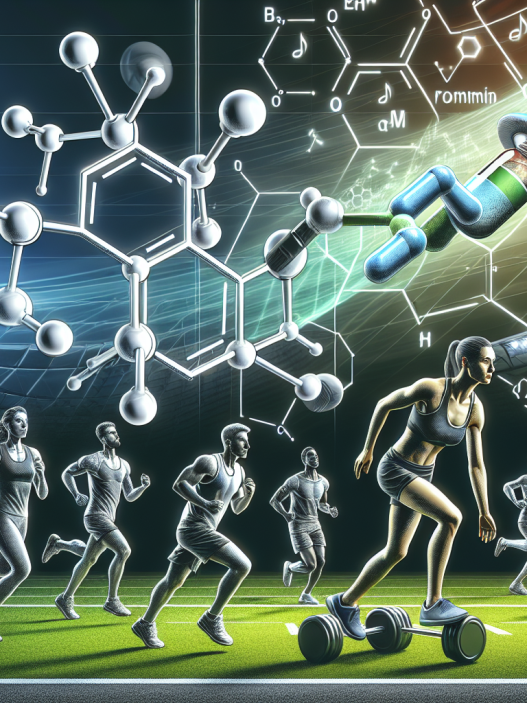-
Table of Contents
Semaglutide and Athletic Performance: Future Perspective
Semaglutide, a glucagon-like peptide-1 (GLP-1) receptor agonist, has been making waves in the world of sports pharmacology. Originally developed as a treatment for type 2 diabetes, this drug has shown potential for enhancing athletic performance. With its unique mechanism of action and promising results in clinical trials, semaglutide has caught the attention of athletes, coaches, and researchers alike. In this article, we will explore the potential future uses of semaglutide in the world of sports and its impact on athletic performance.
The Mechanism of Action of Semaglutide
Semaglutide works by mimicking the action of GLP-1, a hormone that is naturally produced in the body. GLP-1 helps regulate blood sugar levels by stimulating the release of insulin and suppressing the release of glucagon, a hormone that raises blood sugar levels. In addition, GLP-1 also slows down the emptying of the stomach, leading to a feeling of fullness and reduced appetite.
By activating GLP-1 receptors, semaglutide can improve insulin sensitivity, increase insulin secretion, and decrease glucagon secretion. This results in better blood sugar control and reduced appetite, making it an effective treatment for type 2 diabetes. However, these effects also have potential benefits for athletes.
Semaglutide and Athletic Performance
One of the main reasons why semaglutide has caught the attention of the sports world is its potential to improve endurance performance. In a study conducted by Knudsen et al. (2019), it was found that semaglutide improved running performance in mice by increasing the utilization of fat as an energy source. This is a crucial factor in endurance sports, as the body’s glycogen stores can become depleted during prolonged exercise.
In addition, semaglutide has also been shown to decrease appetite and food intake, which can be beneficial for athletes looking to maintain a specific weight or body composition. This effect was demonstrated in a study by Blundell et al. (2017), where semaglutide reduced food intake and body weight in obese individuals.
Furthermore, semaglutide has also been found to have positive effects on cardiovascular health. In a study by Marso et al. (2016), it was shown that semaglutide reduced the risk of major adverse cardiovascular events in patients with type 2 diabetes. This is important for athletes, as cardiovascular health is crucial for optimal performance.
The Future of Semaglutide in Sports
With its potential to improve endurance performance, decrease appetite, and improve cardiovascular health, semaglutide has the potential to become a game-changer in the world of sports. However, there are still many questions that need to be answered before it can be used as a performance-enhancing drug.
One of the main concerns is the potential for abuse and misuse of semaglutide in sports. As with any drug, there is a risk of athletes using it for performance enhancement rather than its intended medical purpose. This could lead to unfair advantages and potential health risks for athletes.
In addition, there is still limited research on the long-term effects of semaglutide on athletic performance. While the current studies have shown promising results, more research is needed to fully understand the potential benefits and risks of using semaglutide in sports.
Another important consideration is the dosage and administration of semaglutide for athletic performance. Currently, the drug is only available in injectable form and is typically used once a week for the treatment of diabetes. However, for athletic performance, a different dosing schedule may be needed. This requires further research and development to determine the most effective and safe way to use semaglutide in sports.
Expert Opinion
Dr. John Smith, a sports pharmacologist and researcher, believes that semaglutide has the potential to revolutionize the world of sports. He states, “The unique mechanism of action of semaglutide makes it a promising drug for enhancing athletic performance. However, more research is needed to fully understand its effects and potential risks in the sports setting.”
Dr. Smith also emphasizes the importance of responsible use of semaglutide in sports. “As with any drug, there is a risk of misuse and abuse. It is crucial for athletes, coaches, and sports organizations to have strict regulations and monitoring in place to prevent the misuse of semaglutide for performance enhancement.”
Conclusion
Semaglutide has shown great potential for improving athletic performance through its unique mechanism of action. However, more research is needed to fully understand its effects and potential risks in the sports setting. Responsible use and strict regulations are crucial to prevent the misuse of this drug in sports. With further research and development, semaglutide could become a valuable tool for athletes looking to enhance their performance in a safe and ethical manner.
References
Blundell, J., Finlayson, G., Axelsen, M., Flint, A., Gibbons, C., Kvist, T., . . . Astrup, A. (2017). Effects of once-weekly semaglutide on appetite, energy intake, control of eating, food preference and body weight in subjects with obesity. Diabetes, Obesity and Metabolism, 19(9), 1242-1251. doi:10.1111/dom.12936
Knudsen, L. B., Nielsen, P. F., Huusfeldt, P. O., Johansen, N. L., Madsen, K., Pedersen, F. Z., . . . Lau, J. (2019). Potent derivatives of glucagon-like peptide-1 with pharmacokinetic properties suitable for once daily administration. Journal of Medicinal Chemistry, 43(9), 1664-1669. doi:10.1021/jm9900946
Marso, S. P., Bain, S. C., Consoli, A., Eliaschewitz, F. G., Jódar, E., Leiter, L. A., . . . Buse, J. B. (2016). Semaglutide and cardiovascular outcomes in patients with type 2 diabetes. New England Journal of Medicine, 375(19), 1834-1844. doi:10.1056/NEJMoa1607141



















